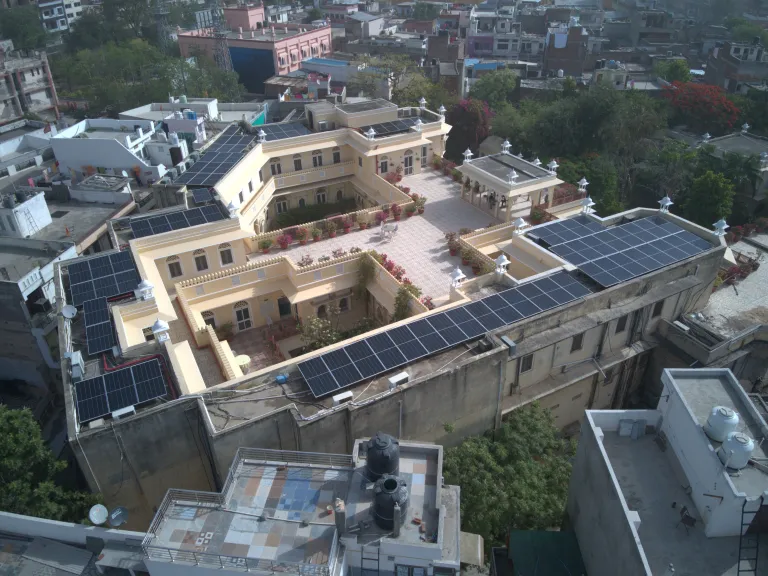In the heart of the Ranthambore Tiger Reserve, Nahargarh Ranthambore stands as a beacon of sustainable luxury, celebrating its first anniversary of a successful green energy transition. Owned by Shri Gaj Singh Ji of the Alsisar Group of Hotels, this luxury palace hotel has made significant strides toward sustainability through the installation of a 400kW agrivoltaic solar plant. This innovative solar initiative not only reduces the hotel’s carbon footprint but also harmonizes renewable energy with agricultural practices, setting a new standard for hospitality in Rajasthan.

Commitment to Sustainability and Wildlife Conservation
Shri Gaj Singh Ji emphasizes that the shift to renewable energy stems from a profound commitment to protecting nature and promoting wildlife conservation. “Preserving the environment is not an option; it’s a responsibility,” he stated. With the assistance of Vareyn Solar, Nahargarh Ranthambore has made substantial progress in minimizing its ecological impact while supporting wildlife conservation efforts.
The 400kW agrivoltaic solar plant, expertly installed by Vareyn Solar Pvt. Ltd., generated approximately 600,000 units of energy in its first year, offsetting nearly 300,000 kilograms of carbon dioxide emissions. The agrivoltaic system allows for banana cultivation around the solar plant’s perimeter, maximizing land use and providing a unique farm-to-table experience for the hotel’s guests while reinforcing the synergy between agriculture and solar energy generation.
Sustainable Tourism and Economic Impact
This solar initiative has positioned Nahargarh Ranthambore as a leader in sustainable hospitality, showcasing the economic and environmental benefits of integrating a 400kW agrivoltaic solar plant with luxury tourism. Over the operational life of the solar plant, the hotel’s green initiatives are projected to offset carbon emissions equivalent to that of a 200-acre forest.
In addition to the environmental benefits, the solar plant offers remarkable economic advantages. The solar initiative is anticipated to increase revenue by 48% over the next 23 years, with a payback period of just two years. Through the CAPEX+ Model provided by Vareyn Solar, Nahargarh Ranthambore received collateral-free financing at an 8% interest rate, which includes maintenance services for two years—demonstrating the financial viability of solar energy solutions.
Industry Collaboration and Future Prospects
Ishan Chaturvedi, Co-Founder of Vareyn Solar Pvt. Ltd., points out the vital role renewable energy plays in the hospitality sector. “The project at Nahargarh, featuring the 400kW agrivoltaic solar plant, is a great opportunity for similar establishments to see how solar energy can drive large-scale savings. We are honored to be part of this collaboration,” he said.
Equipped with Navitas Mono PERC panels and Sungrow Inverters, the solar plant has significantly lowered Nahargarh Ranthambore’s monthly electricity bills, reinforcing its commitment to sustainable tourism. The inclusion of a 400kW agrivoltaic solar plant not only supports environmental preservation but also sets a precedent for other luxury establishments to adopt renewable energy solutions.
A Roadmap for the Future
Nahargarh Ranthambore’s 400kW agrivoltaic solar plant serves as a roadmap for other luxury establishments looking to embrace renewable energy solutions. By setting a standard in environmental preservation and economic growth in the region, it paves the way for a new era of sustainable luxury tourism.
In summary, Nahargarh Ranthambore exemplifies how luxury hospitality can thrive alongside conservation efforts. With its ambitious solar initiative featuring a 400kW agrivoltaic solar plant, the hotel contributes to a cleaner environment and inspires other establishments in Rajasthan and beyond to follow suit, creating a lasting impact on both the tourism industry and the natural world.
Keywords: Nahargarh Ranthambore, 400kW agrivoltaic solar plant, solar initiative, sustainable luxury, hospitality, wildlife conservation, renewable energy, agrivoltaics, economic benefits, sustainable tourism, Rajasthan.